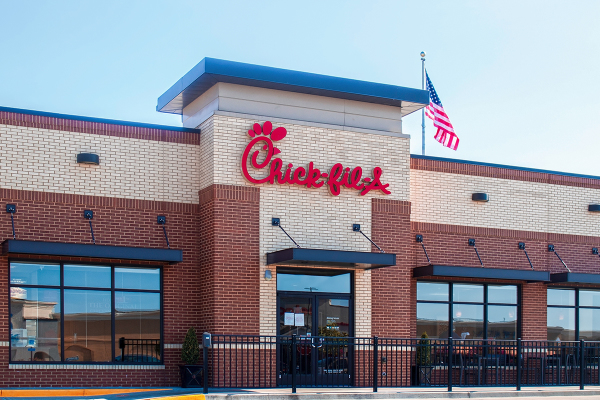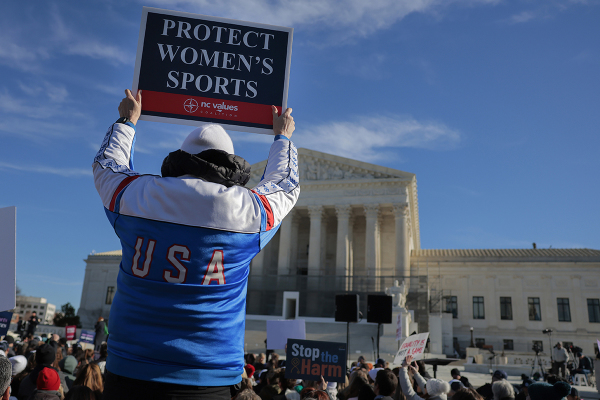Pro-lifers optimistic after Supreme Court abortion arguments; Planned Parenthood expresses concern
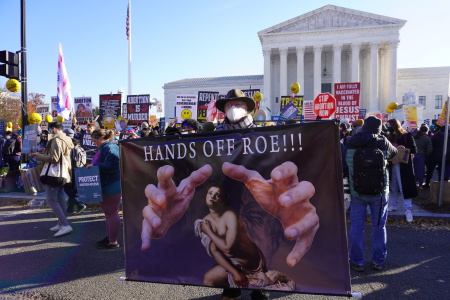
WASHINGTON — Pro-life activists have expressed optimism while the head of the nations largest abortion provider expressed concern after the U.S. Supreme Court held oral arguments on Mississippi’s 15-week abortion ban Wednesday, a case that could alter longstanding judicial precedent legalizing abortion nationwide.
Activists on both sides of the abortion debate held dueling rallies outside the Supreme Court as justices heard oral arguments in the case of Dobbs v. Jackson Women’s Health. Mississippi is asking the justices to reverse a lower court ruling striking down the state’s 15-week abortion ban while the Biden administration and pro-abortion groups would like to see the justices uphold the lower court ruling.
A ruling in favor of Mississippi would significantly chip away at the precedent set by the 1973 Supreme Court decision Roe v. Wade, which ruled that women have the right to obtain an abortion. Pro-life activists have characterized the case as a “landmark opportunity” to revisit the abortion decision. In the 1992 Supreme Court decision Planned Parenthood v. Casey, the justices upheld the central finding of Roe.
With a 6-3 conservative majority on the court, Chief Justice John Roberts, who is seen as the most moderate of the conservative-appointed justices, asked some pointed questions about how Mississippi’s 15-week ban differs from the standard seen around the world.
“I’d like to focus on the 15-week ban because that’s not a dramatic departure from viability,” Roberts said during the arguments. “It is the standard that the vast majority of other countries have.”
“When you get to the viability standard, we share that standard with the People’s Republic of China and North Korea,” the chief justice added.
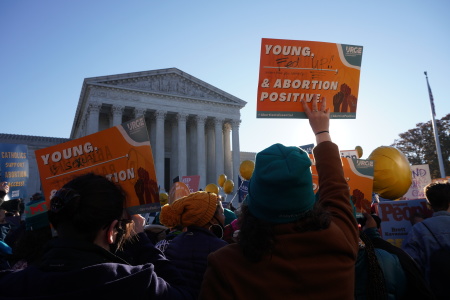
Speaking outside of the Supreme Court following the oral arguments, Steve Daines, R-Mont., spoke of how Roberts brought up how the U.S. has some of the most permissive abortion laws in the world and is one of the few that allows late-term abortion.
While Roberts was appointed by Republican President George W. Bush, he has sided with Democrat-appointed judges in recent abortion cases, most recently in the case of June Medical Services v. Russo, where Roberts joined the four liberal justices in striking down a Louisiana law that required abortion doctors to have admitting privileges at nearby hospitals.
“One important thing to note is that Justice Roberts, the chief justice, asked some very significant and powerful questions,” said Father Frank Pavone, the director of the pro-life lobbying group Priests for Life. “Justice [Brett] Kavanaugh went through a whole litany of the … instances in which the Supreme Court reversed its precedent.”
Kavanaugh, who during his 2018 Senate confirmation hearing said he thought Roe was an “important precedent” that has been reaffirmed many times, listed off a number of past cases in which the Supreme Court overturned long-held precedents, such as Brown v. Board of Education, Baker v. Carr and Lawrence v. Texas.
While it can be difficult to predict the outcome of a Supreme Court case just by listening to the questioning in oral arguments, James Bopp Jr., the general counsel for the national pro-life lobbying group National Right to Life, said the arguments were “very encouraging.”
“It is apparent from the questions that a majority of the Court is seriously considering at least rejecting the viability line that currently prohibits prohibitions on abortion prior to viability,” Bopp said in a statement.
“But the key question seems to be how far the Court is willing to go, either a decision that just rejects the viability line, permitting states to argue that prohibitions on abortion prior to viability are justified by sufficiently compelling state interests or if they will issue a broader decision which explicitly either totally or partially overrules Roe and/or Casey. There appears to be several Justices whose questions seemed to favor one path or the other, who would constitute a majority,” he added.
Opponents of the Mississippi law have consistently pointed to the principle of stare decisis and the importance of abiding by a legal precedent that has determined that the Fourteenth Amendment to the Constitution contains a right to privacy that guarantees women the right to have an abortion.
Alexis McGill Johnson, the president of the nation’s largest abortion provider, Planned Parenthood, called the arguments “alarming” but “not surprising.”
“The majority of the Supreme Court justices appeared prepared to allow politicians to control what we can do with our bodies,” she said in a statement. “Let’s be clear, if the Supreme Court allows Mississippi’s ban to stand, it will erase nearly 50 years of precedent, put abortion access at risk across the country, and, in the words of Justice Sotomayor, create a ‘stench’ in the public perception of the Court and its legitimacy.”
Pavone also cited a comment from Justice Samuel Alito, who recalled that “abortion was not legal before quickening in 26 out of 37 states at the time when the Fourteenth Amendment was adopted.”
“To say that the Fourteenth Amendment somehow includes the right to have an abortion is absurd,” Pavone argues. “It’s contrary to history.”
Justice Amy Coney Barrett, one of three justices appointed to the bench by former President Donald Trump, mentioned “safe-haven laws” that allow parents who are not ready to raise a child to leave a baby at a hospital or firehouse or police station with no questions asked.
Pavone argued “safe-haven laws” — many of which have been passed since Casey — is one of many factors making the Roe ruling obsolete. He disagreed with Justice Elena Kagan’s assertion that “not much has changed since Roe and Casey.”
Mayra Schneider, who described herself as a “fully licensed therapist who loves Jesus,” was among the many who attended rallies outside the Supreme Court building. She told CP that she was there to “say no to abortion.”
“We’re appealing to the courts of Heaven to put an end to this,” Schneider, a member of the Salt and Light Brigade who lives in Maryland, said, predicting that a ruling in favor of Mississippi would lead to a “snowball” effect that would “go all over America and all over the world.”
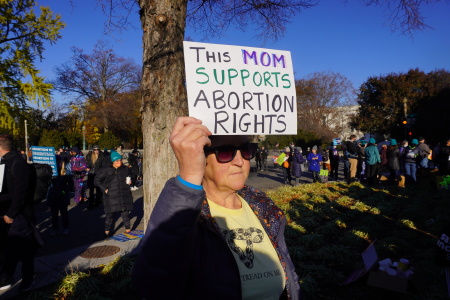
Dee Doyle, a Roe v. Wade supporter originally from New Jersey who currently resides in Arlington, Virginia, told CP that she believes Roe is “settled law” and supports “a woman’s right to make a decision about her own body.” The mother of two said that if she did not have an abortion earlier in her life, she “would not have those two beautiful children.”
“I am forever grateful that that option was available to me as a young person who made a mistake,” she said. “It should always be a woman’s decision.”
“It is a choice, a decision between a woman and her doctor about everything related to pregnancy and fertility,” she added.
Mary from Silver Spring, Maryland, attended the pro-choice protest and said she thinks access to abortion is “an innate human right that either side should be able to recognize.”
While Mary was raised Catholic and pro-life, she came to believe that abortion was something “women deserve to have no matter what.”
“I just think a woman should not be forced to carry a child if they don’t want to,” she stated.
Rev. Rich Penkoski, a pastor from Mount Juliet, Tennessee, attributed his presence at the pro-life protest to a desire to “talk about how God hates abortion,” claiming that “there’s a holocaust against the unborn.”
Penkoski believes that the Dobbs case “goes at the heart of Roe v. Wade,” asserting that “if we can say we can ban abortion at 15 weeks, why can’t we ban it at six weeks, one week and then get rid of it all together?”
“This is the start of the dismantling of Roe v. Wade,” he declared. “We need all Christians across this country to actually lift up their voice and do what God said in Isaiah 58:1: ‘Lift up your voice like a trumpet. Do not hold back.’”
Father Burl Salmon, the rector of the Falls Church, an Episcopalian church in Falls Church, Virginia, and president of the clergy advocacy board for Planned Parenthood of America, had a different perspective on how people of faith should view the abortion debate.
“God loves all of God’s children and especially trusts God’s children to make the decisions that are best for furthering the kingdom,” Salmon said.
The Dobbs case is the first major abortion case to appear before the Supreme Court since the late Justice Ruth Bader Ginsburg, beloved by progressives, was replaced with Barrett. Barrett’s appointment to the court means that six of the nine justices were appointed by Republican presidents while the remaining three were appointed by Democrats.
Some Democrats have warned that a ruling in favor of Mississippi in Dobbs would add to calls to increase the number of justices on the Supreme Court to dilute the effect of the nominally conservative majority, a proposal derided by critics as “court-packing.”
A decision in Dobbs is expected by the end of June 2022 at the latest.
While Mississippi’s 15-week abortion ban was passed several years ago, the oral arguments in the Dobbs case come as the pro-abortion Guttmacher Institute has lamented 2021 as “the most devastating antiabortion state legislative session in decades” as a record number of pro-life measures have become law at the state level.
Pro-abortion activists have expressed disappointment that the Supreme Court has not taken more decisive action to block a Texas law that bans abortions after a heartbeat can be detected, usually at around six weeks gestation. The law remains in effect as the Supreme Court considers whether the legislation is constitutional.
If the justices find the law constitutional, states will have the green light to adopt similar 15-week abortion bans, while abortion laws in states such as New York that allow late-term abortion will remain in effect.
Ruben Israel, a street preacher from Los Angeles, acknowledged that if the Mississippi law was upheld, the issue of abortion “is going to go back to the states.”
Since a ruling in favor of Mississippi will not have the effect of making abortion illegal nationwide, Dr. Michael New, a research associate at the Catholic University of America and associate scholar at the pro-life Charlotte Lozier Institute, maintained in an interview with The Christian Post that “no matter what happens, we still have a lot of work to do.”
Ryan Foley is a reporter for The Christian Post. He can be reached at: ryan.foley@christianpost.com












